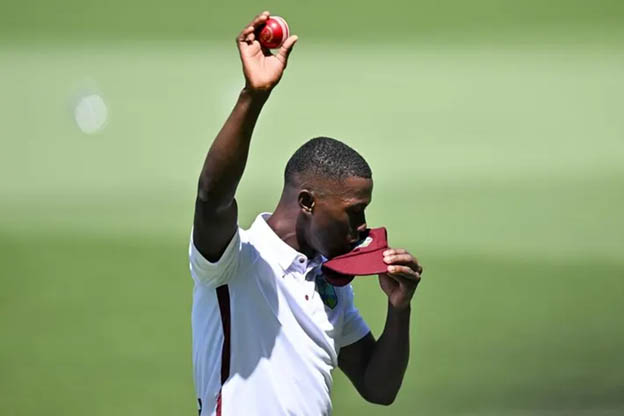
The two 50 overs World Cup title wins in 1975 and 1979 during that unmatched 15-year world dominance by the Windies or Brian Lara’s two world record batting feats should top the list of joyous fan moments but Joseph’s feat Down Under shouldn’t be far behind in the current two-Test series.
Not being born at the time, and not in a position to be motivated by it all, Joseph might’ve only been told about those feats, which makes his Test debut excellence even more remarkable .
However you rate them, none of the Dream Team stalwarts, the likes of Richards, Marshall, Holding, Roberts, Lloyd or Lara had better Test debut accomplishments than the young Guyanese.
In a blink of an eye Joseph’s eye- popping five-wicket maiden Test match haul including the scalp of current world renowned Steve Smith with his very first delivery, left supporters in awe. And aided by fearless, robust batting at number 11 including a second best team top score, the paceman’s awesome debut dominated the headlines and made Guyana the top focus in global sports media. His home village Baracara was burning up internet search engines.
Australia is arguably one of the most difficult of places for visiting teams to play, but Joseph bucked the trend of intimidation influenced failures for debutants with his sterling performance in the Adelaide first Test.
And after a mere two years from an existence of tape ball play and zero exposure to organized competition in remote Baracara, Joseph’s whirlwind development is the stuff dreams are made off.
For the record the right-arm paceman’s resume comprises a mere four first class games in the West Indies Regional four-day competition, two A team Tests against South Africa and two in the Caribbean Premier League (CPL).
Yet he rocked the Aussie batting order, in which all 10 wickets were claimed by the tourists which they couldn’t do once in two games 12 months earlier.
Nevertheless, the resulting three-day defeat last week was a continuation of the Caribbean team’s dismal performances in all formats, but a reminder that Joseph’s feats mean the well of West Indies talent is not completely empty.
The last West Indian to scalp five wickets in a debut Test overseas was none of Roberts, Marshall, Holding, Garner and Croft, the principal hitmen from the legendary four-pronged pace attack.
It was way back in the 1930s and Joseph followed up more than 80 years later, defying the odds in a country where the intimidation factor can turn a young player’s focus to mush.
He did it with pacy out-swingers and vicious bouncers and after following up with his explosive batting, the television commentators and Adelaide crowd were won over. They soon couldn’t get enough of his charming on-field antics and sprint-to-the boundary wicket celebrations.
However, the “one swallow doesn’t make a summer”, expression is worthy, you get the impression Joseph will not be left with the “flash-in-the-pan tag.
You must be the genuine article to spoil Smith’s prolific runs-streak even if it’s in the unfamiliar opening slot or fell Usman Khawaja with a vicious bouncer and use the yorker to good effect. The said attributes justified the normally partisan home TV commentators’ view that the right-armer should’ve been let loose from the get-go with the brand new ball in Australia’s second innings
But how did it all start for Joseph? How could someone with such limited exposure instantly produce the goods at the highest level, against the world champions in their own backyard?
The patriots among us would point out Joseph’s Maroon lineage from that previously unknown Baracara community and the notion that Jamaica’s incredible universal achievements in athletics, cricket, football and other disciplines are due to the natural physical qualities inherited from that said group of ex -slaves.
The player’s most noted quality though is clearly his hunger to succeed, a trait almost non-existent among current Regional cricketers.
It requires a special courage and desire to quit one’s day job, in Joseph’s case doing the rounds in security, with a family to feed, to venture into the unknown world of trying to make it in the risky world of professional sports.
Ex- national player, now United Kingdom- based coach Nolan McKenzie exemplified Joseph’s zeal while recounting an interaction with the player last year. It was during that coaching stint organized by the indefatigable Hilbert Foster, Berbice’s hardest working administrator ever, which featured legendary former Test paceman Curtly Ambrose. According to McKenzie, the fast bowling-centric stint, included a session for batting. Joseph had the audacity to coax his way into getting a hit and proceeded to belt sixes out of the ground with such ease, the former opening batsman predicted the young fast bowler becoming a better batsman than most of his Guyana teammates. Less than six months after, Joseph proved in Australia he’s being wasted at number 11 in the West Indies lineup.
Enthusiasm though, can only take you so far as Joseph also seems to have an appetite to grind out training sessions at every opportunity.
So far it has paid dividends in fast- forwarding the Berbician’s career.
During the 2023 Caribbean Premier League (CPL) an undrafted Joseph was spotted in the nets, reportedly by an associate of Amazon Warriors new captain Imran Tahir, who noted his potential and promptly convinced the latter to have him contracted following which the player made two appearances in the team’s victorious campaign.
Unfold
That was shortly before Joseph’s story started to unfold.
It became even bigger when former national fast bowler Kevin Darlington now a United States based coach, said he saw the young man enjoying a scrubby tape ball game in Berbice, noted his ability and subsequently influenced national coach at the time Eusan Crandon to grant him a provisional contract.
Today the rest is history.
Yet, Joseph’s fairytale entry into the Tests must not lull cricket administrators into a false sense of security.
Another Joseph wouldn’t appear on the scene now or in the near future unless the greater emphasis is placed on player development.
Unless the sport’s infrastructure is speedily overhauled and administrators embrace the cricket first mentality, West Indies will continue to hover around the international rankings lower quarter.
Presently the quality of pitches and training facilities are beyond stone age, compared to most of the cricketing world. Admittedly , resources are a problem but the will to accomplish more with what is available is badly lacking. In Guyana the silly politics must be eliminated, and players made the top priority
Also, why are Foster and Crandon, valuable assets to development, no longer involved at the national level? Of note too is case of the late Clyde Butts, once Regional cricket’s most prolific wicket-taking off spinner, who was abruptly cut off from contributing and likewise ex West Indies vice-captain, coach and lead selector Roger Harper is seemingly persona non grata.
Guyana Cricket Board decision makers must focus on getting a strong national long format club competition going, a major requirement for player-improvement.
Australia wouldn’t be Test and 50 overs world champions without the Sheffield Shield or England, India and New Zealand being powerhouses in all formats without their respective four-day domestic competitions.
Once upon a time the Case Cup and Davson Cup three-day competitions in Demerara and Berbice respectively were the breeding ground for Guyana’s contribution of world beating players.
These days Demerara has nothing to compare and while Berbice’s much greater commitment to staging club competitions, has resulted in a flood of Ancient County players to national teams, nothing there now matches the Davson series. In Essequibo the stagnation of meaningful competitions is continuing unabated with administrators seemingly more intent on off field battles among themselves instead of it being between bat and ball. Nationwide schools cricket competitions remain an historic event as the promise of sport being inserted into the curriculum amounts to nothing more than lip service.
With the abundance of oil money circulating in the purported richest country in South America per capita, an annual national three-day club competition among the best teams from the two major counties and the Essequibo champion side is a must.
The three -team Inter County competition wouldn’t cut it.
Shamar Joseph has brought us much joy, but he cannot win Test series and limited overs titles by himself. The collective effort from a team perspective required for overall success will not be had with the current undesirable state of affairs.






